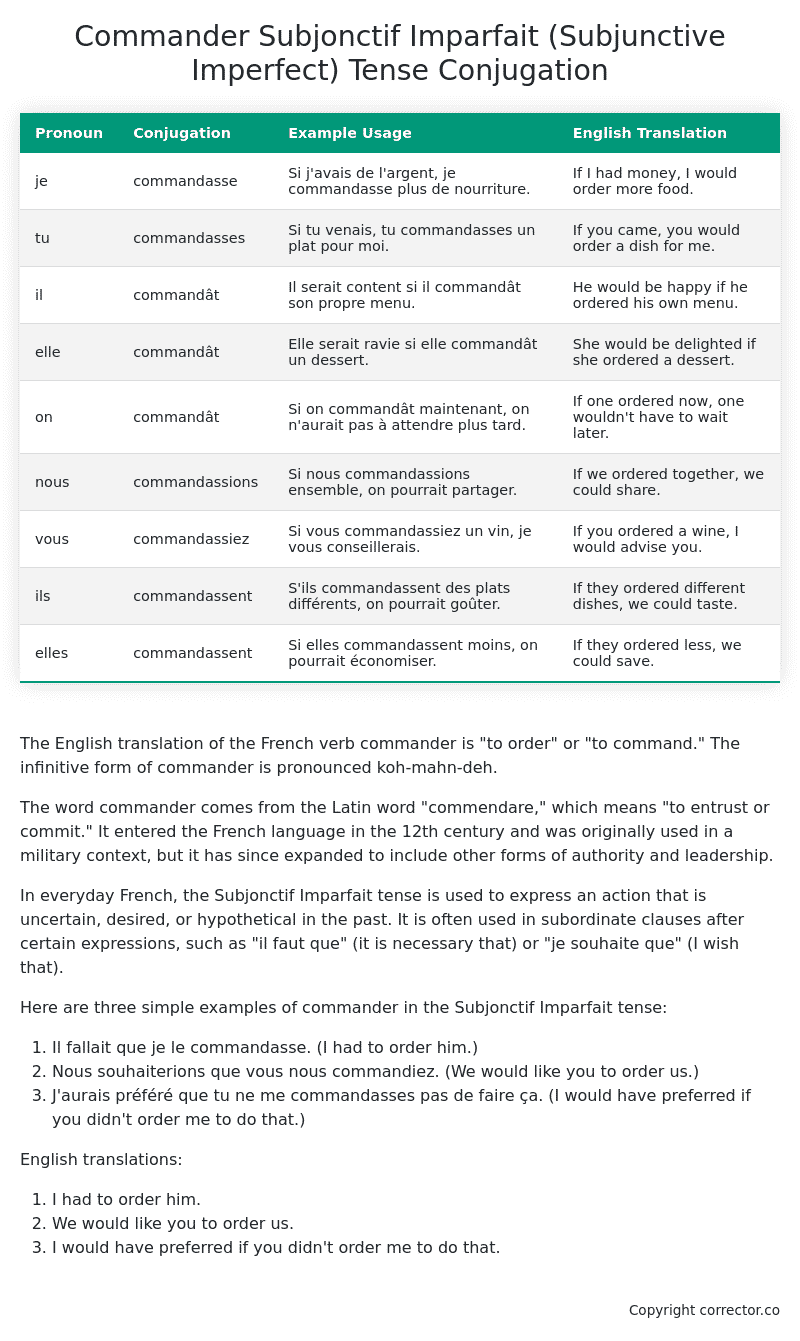Subjonctif Imparfait (Subjunctive Imperfect) Tense Conjugation of the French Verb commander
Introduction to the verb commander
The English translation of the French verb commander is “to order” or “to command.” The infinitive form of commander is pronounced koh-mahn-deh.
The word commander comes from the Latin word “commendare,” which means “to entrust or commit.” It entered the French language in the 12th century and was originally used in a military context, but it has since expanded to include other forms of authority and leadership.
In everyday French, the Subjonctif Imparfait tense is used to express an action that is uncertain, desired, or hypothetical in the past. It is often used in subordinate clauses after certain expressions, such as “il faut que” (it is necessary that) or “je souhaite que” (I wish that).
Here are three simple examples of commander in the Subjonctif Imparfait tense:
- Il fallait que je le commandasse. (I had to order him.)
- Nous souhaiterions que vous nous commandiez. (We would like you to order us.)
- J’aurais préféré que tu ne me commandasses pas de faire ça. (I would have preferred if you didn’t order me to do that.)
English translations:
- I had to order him.
- We would like you to order us.
- I would have preferred if you didn’t order me to do that.
Table of the Subjonctif Imparfait (Subjunctive Imperfect) Tense Conjugation of commander
| Pronoun | Conjugation | Example Usage | English Translation |
|---|---|---|---|
| je | commandasse | Si j’avais de l’argent, je commandasse plus de nourriture. | If I had money, I would order more food. |
| tu | commandasses | Si tu venais, tu commandasses un plat pour moi. | If you came, you would order a dish for me. |
| il | commandât | Il serait content si il commandât son propre menu. | He would be happy if he ordered his own menu. |
| elle | commandât | Elle serait ravie si elle commandât un dessert. | She would be delighted if she ordered a dessert. |
| on | commandât | Si on commandât maintenant, on n’aurait pas à attendre plus tard. | If one ordered now, one wouldn’t have to wait later. |
| nous | commandassions | Si nous commandassions ensemble, on pourrait partager. | If we ordered together, we could share. |
| vous | commandassiez | Si vous commandassiez un vin, je vous conseillerais. | If you ordered a wine, I would advise you. |
| ils | commandassent | S’ils commandassent des plats différents, on pourrait goûter. | If they ordered different dishes, we could taste. |
| elles | commandassent | Si elles commandassent moins, on pourrait économiser. | If they ordered less, we could save. |
Other Conjugations for Commander.
Le Present (Present Tense) Conjugation of the French Verb commander
Imparfait (Imperfect) Tense Conjugation of the French Verb commander
Passé Simple (Simple Past) Tense Conjugation of the French Verb commander
Passé Composé (Present Perfect) Tense Conjugation of the French Verb commander
Futur Simple (Simple Future) Tense Conjugation of the French Verb commander
Futur Proche (Near Future) Tense Conjugation of the French Verb commander
Plus-que-parfait (Pluperfect) Tense Conjugation of the French Verb commander
Passé Antérieur (Past Anterior) Tense Conjugation of the French Verb commander
Futur Antérieur (Future Anterior) Tense Conjugation of the French Verb commander
Subjonctif Présent (Subjunctive Present) Tense Conjugation of the French Verb commander
Subjonctif Passé (Subjunctive Past) Tense Conjugation of the French Verb commander
Subjonctif Imparfait (Subjunctive Imperfect) Tense Conjugation of the French Verb commander (this article)
Subjonctif Plus-que-parfait (Subjunctive Pluperfect) Tense Conjugation of the French Verb commander
Conditionnel Présent (Conditional Present) Tense Conjugation of the French Verb commander
Conditionnel Passé (Conditional Past) Tense Conjugation of the French Verb commander
L’impératif Présent (Imperative Present) Tense Conjugation of the French Verb commander
L’infinitif Présent (Infinitive Present) Tense Conjugation of the French Verb commander
Struggling with French verbs or the language in general? Why not use our free French Grammar Checker – no registration required!
Get a FREE Download Study Sheet of this Conjugation 🔥
Simply right click the image below, click “save image” and get your free reference for the commander Subjonctif Imparfait tense conjugation!

Commander – About the French Subjonctif Imparfait (Subjunctive Imperfect) Tense
Formation
Common Everyday Usage Patterns
Interactions with Other Tenses
Subjonctif Présent
Indicatif Passé Composé
Conditional
Conditional Perfect
Summary
I hope you enjoyed this article on the verb commander. Still in a learning mood? Check out another TOTALLY random French verb conjugation!


